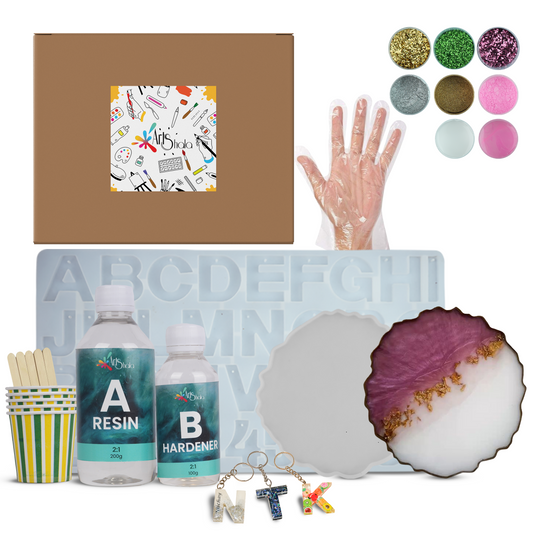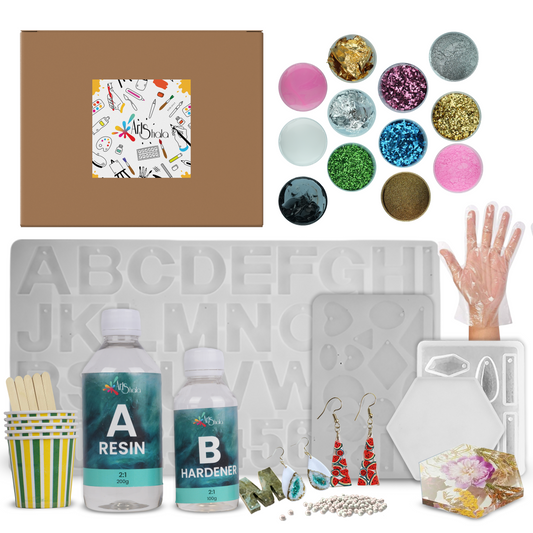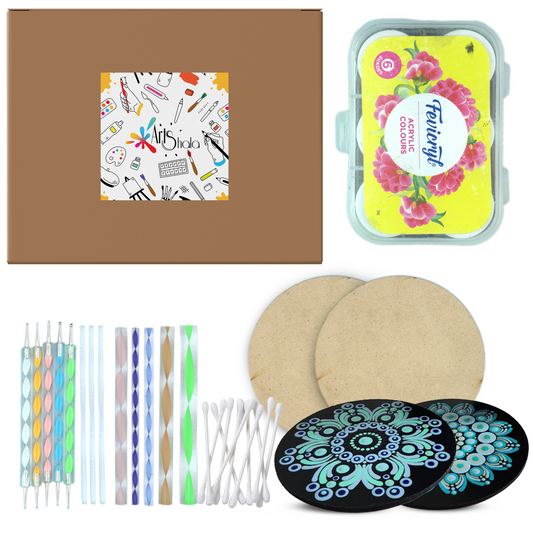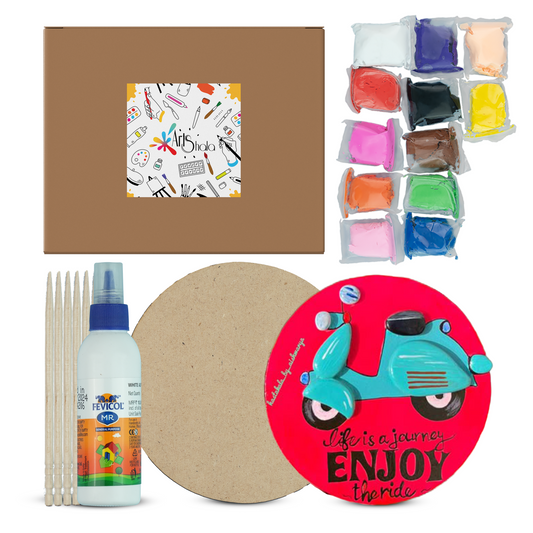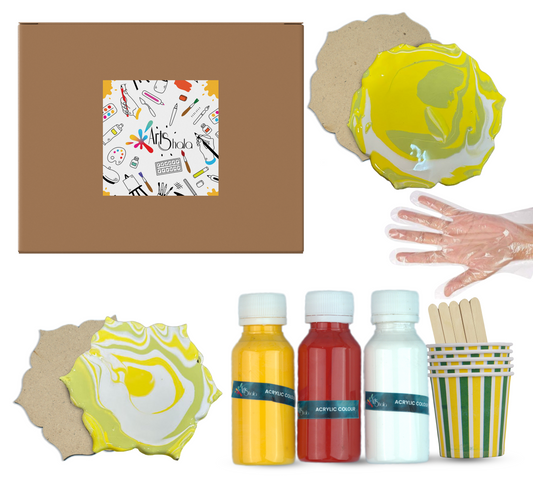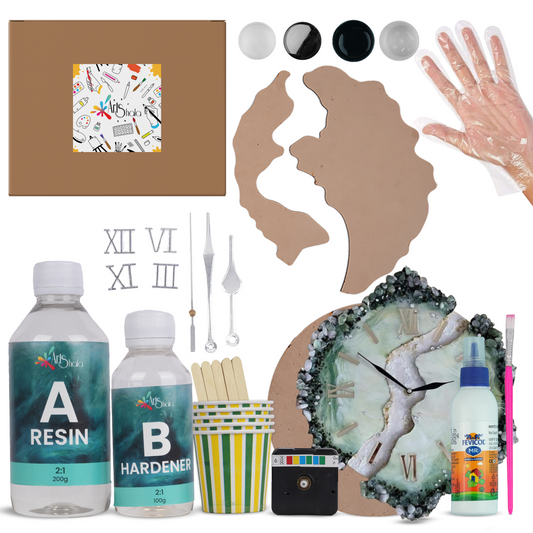Are Epoxy and Resin the Same?
Due to the growing popularity of DIY projects and crafts, epoxy and resin are two materials that are often used interchangeably. However, many people need clarification about whether epoxy and resin are the same or if there are any differences between the two. Let's look at epoxy and resin to understand their similarities and distinctions. We recommend joining a resin art workshop to learn the difference in detail, especially if you wish to work under professional guidance.
What is Epoxy?
It is a synthetic resin used for various applications, including coatings, adhesives, and composites. It is created by mixing two components – a resin and a hardener. When these two parts are combined, they undergo a chemical reaction that results in a complex, durable material.
What is Resin?
On the other hand, this is a more general term that refers to a class of polymer materials, typically highly viscous liquids or solids. It can be natural or synthetic and is often used in casting, moulding, and coating applications. It is a critical component in various products, from plastics and paints to adhesives and sealants.
Are Epoxy and Resin the Same Thing?
While epoxy and resin are polymers, they are not the same thing. Epoxy specifically refers to a type of resin created by mixing two components, while resin is a more general term encompassing a variety of polymer materials. Therefore, all epoxies are resins, but not all resins are epoxies.
What Are the Differences Between Epoxy and Resin?
Following are some of the key differences in both materials. Understanding them will help you gain more knowledge.
- Composition: Epoxy is a resin known for its high strength, toughness, and chemical resistance. It consists of two components - a resin and a hardener - that must be mixed in a specific ratio for proper curing. On the other hand, Resin is a more general term that refers to a wide range of polymer-based materials used for casting, coating, or laminating.
- Viscosity: Epoxy typically has a thicker consistency and higher viscosity than resin, which is more fluid and pourable. This difference in viscosity can affect the flow, self-leveling properties, and bubble release of the two materials during application.
- Applications: Epoxy is commonly used for bonding, filling, and structural repairs due to its high strength and adhesive properties. It is often used in construction, automotive, and marine industries. Resin, on the other hand, is often used for casting, embedding, and coating due to its precise, glossy finish and easy pourability.
- Curing Time: Epoxy generally has a faster curing time than resin. Depending on the specific formulation and environmental conditions, epoxy can be cured within a few hours to a day. The resin may take longer to settle and fully harden, sometimes up to several days or weeks.
What Are the Similarities Between Epoxy and Resin?
Despite being different in various ways, here are some similarities of these elements:
- Chemical Composition: Epoxy and resin are polymers created through a chemical reaction between two components - a resin and a hardener. This reaction produces a durable and robust material commonly used for bonding, coating, and sealing.
- Versatility: Both epoxy and resin can be used for various applications, including crafting, woodworking, jewellery making, and industrial projects. They can be tinted, pigmented, or mixed with additives to achieve different colours, textures, and finishes.
- Curing Process: Epoxy and resin undergo a curing process where they harden into a solid form. This process typically involves mixing the resin and hardener in the correct ratio and allowing the mixture to cure at room temperature or with heat application.
- Strength and Durability: Once fully cured, epoxy and resin offer excellent adhesion, strength, and durability. They can withstand moisture, heat, chemicals, and UV exposure, making them ideal for outdoor and high-traffic applications.
How to Choose Between Epoxy and Resin?
Due to their widespread demand and unique qualities, both materials are an excellent choice for art projects. But sometimes, you need something specific. Here is how to choose between the two and prepare a fantastic art piece.
Epoxy and resin are both types of polymers, but they have different chemical compositions. Epoxy is created by mixing two components - a resin and a hardener. Once mixed, epoxy cures into a hard, durable material resistant to heat, moisture, and chemicals. On the other hand, Resin is a more general term that refers to a liquid substance that hardens into a solid form. Resin can be made from various materials, such as acrylic, polyester, or polyurethane.
When deciding between epoxy and resin, it's essential to consider the specific application of your project. Epoxy is known for its strength and durability, making it ideal for projects requiring high resistance to wear and tear, such as tabletops, countertops, and flooring. Resin is often used for more delicate projects, such as jewellery making, art pieces, and decorative items.
The working time is another factor to consider when choosing between epoxy and resin. Epoxy typically has a shorter working time, meaning you must work quickly once the two components are mixed. On the other hand, Resin often has a longer working time, giving you more flexibility to work on your project without feeling rushed.
In addition to the working time, it's essential to consider the curing time of epoxy and resin. Epoxy typically cures faster than resin, meaning you can complete your project in less time. Resin, on the other hand, may take longer to cure, requiring you to wait before handling or moving your project.
Cost is another factor to consider when choosing between epoxy and resin. Epoxy is generally more expensive than resin due to its strength and durability. However, if you are working on a smaller project that does not require the same level of durability, the resin may be a more cost-effective option.
Conclusion
While epoxy and resin are versatile materials that can be used for a wide range of projects, they are not the same. Epoxy specifically refers to a type of resin created by mixing two components, while resin is a more general term encompassing a variety of polymer materials.
Understanding the differences between epoxy and resin can help you choose the suitable material for your next crafting or DIY project. To learn more about these materials, their techniques, and how to use them correctly, visit Arts Shala's website. Contact Us for more information.



